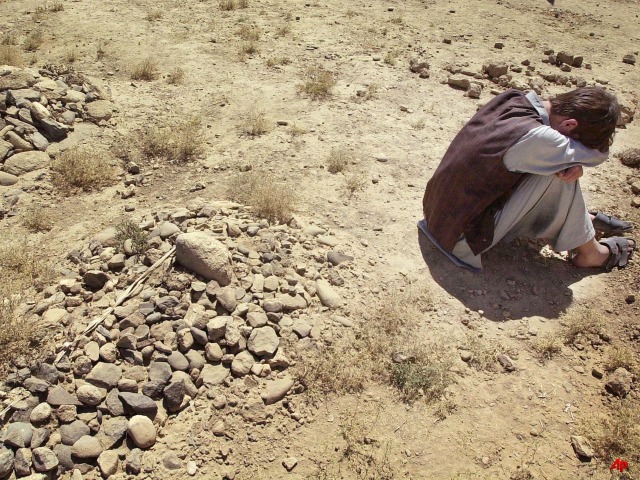The Afghan Ministry of Public Health (MoPH) reported that 4,466 self-poisoning and 4,136 self-immolation cases have been registered this year alone across Afghanistan, where suicides exceed deaths by homicide and the war combined annually.
According to MoPH, those figures were made public on September 10 during a World Suicide Prevention Day event that the ministry sponsored along with the Afghanistan Ministry of Women’s Affairs, the World Health Organization (WHO), and the United Nations Population Fund (UNFPA).
Dr. Rik Peeperkorn, the WHO representative for Afghanistan, pointed out that more Afghans commit suicide annually than are killed by the combination of nationwide homicides and the war.
“The number of lives lost each year through suicide exceeds the number of deaths due to homicide and war combined. Every 40 seconds another family loses a loved one to suicide,” said Dr. Peeperkorn. “Policy and legislative actions are needed to prevent suicide, together with awareness raising of suicide as a public health problem in Afghanistan. Surveillance and reporting on suicides and suicide attempts also needs strengthening to devise effective interventions.”
U.S. taxpayers have invested an unprecedented $104 billion on nation-building in Afghanistan, aimed, in part, at expanding health care access and refining the standard of living and rule of law.
According to the U.S. watchdog for Afghanistan reconstruction, the corruption plaguing the nation has hindered the extent to which those funds have benefited the Afghan people.
Dr. Najia Tariq, the deputy minister of health care services for MoPH, is credited with revealing the number of self-poisoning and self-immolation incidents registered in Afghanistan so far in 2014 during the September 10 suicide prevention event.
According to the public health ministry, Dr. Tariq noted that since the beginning of this year, “4,466 cases of self-poisoning” and “4,136 cases of self-immolation from 30 provinces have been reported, including 166 confirmed suicides.” Afghanistan is made up of 34 provinces.
Of the 4,136 self-immolation cases, at least 2,301 involved women and 2,105 men, Dr. Tariq is quoted as saying during the event by Afghanistan Times.
So far this year, an estimated 707 self-immolation victims have been admitted to the Isteqlal Hospital in Kabul including 342 men and 365 women, “including newlyweds,” added Dr. Tariq in the article.
“The majority of reported cases of suicide and suicide attempts in Afghanistan are women. Gender-based violence is among the main causes for women’s suicides and self-immolation. According to research, the most common reason for self-immolation is forced or child marriage,” noted the UNFPA representative for Afghanistan, Dr. Annette Robertson, according to the public health ministry.
MoPH highlighted a 2007 study by Medica focused on suicide in Afghanistan, which found that girls between the ages of 16 and 19 are susceptible to “committing self-immolation, burning themselves to death.”
“Nearly 80% of women who commit self-immolation are married,” added MoPH in highlighting the study.
Dr. Suraya Sobrang, the women’s rights chief at the Afghanistan Independent Human Rights Commission, told Afghanistan Times that methods of suicide used by Afghan women last year include “self-immolation, self-poisoning, drowning, hanging, and cutting off the artery.”
“Sexual abuse, domestic violence, forced and early marriages” are among the primary reported reasons for female suicides, she added.
“Rape is a seriously frequent offense in Afghanistan, and most often when victim girls turn to their families they are insulted and provoked to commit suicide as families don’t want their reputation smeared,” said Dr. Sobrang when interviewed by Afghanistan Times.
She criticized the MoPH, saying that although the majority of female suicide victims “are rushed to the hospital by the perpetrators of the offense,” the health ministry “refrains from registering the case or informing the police for prosecuting the offenders.”
Most “suicide incidents remained covert due to family disgrace, but suicides would decline substantially if the ministry of health cooperates with the police,” continued Dr. Sobrang.
In the Afghanistan Times article, Baryali Fetrat, a Kabul University lecturer, said, “Democracy has not expanded across the country to protect the women’s rights and it’s quite challenging to defend women in such a society. Women are very vulnerable and often undergo drastic atrocities in their social lives.”
According to Dr. Tariq, “Together with the Mental Health Department, MoPH has designed a [program] for suicide prevention that includes training for psychosocial counselors, professional capacity building on mental health and also establishing psychosocial counseling centers and life skills [programs] for schools.”

COMMENTS
Please let us know if you're having issues with commenting.